
In this issue:
Exploring CSUMB Career and Workforce Preparation Data from the 2023 National Survey of Student Engagement and Faculty Survey of Student Engagement
- Which career preparation activities have students done or planned to do at CSUMB before graduating?
- What career preparation resources does CSUMB provide students and what did NSSE respondents share about these areas?
- How do CSUMB faculty support student career preparation and placement with reference letter writing?
- Where can I find additional data from the 2023 NSSE and FSSE?
In Spring 2023, CSUMB administered both the National Survey of Student Engagement (NSSE) and the Faculty Survey of Student Engagement (FSSE).
To inform the work of CSUMB’s Career Development Office and the Workforce Development President Advisory Committee, both the NSSE and FSSE included careers-oriented topical modules–NSSE: Career & Workforce Preparation and FSSE: Transferable Skills, Career, and Workforce Development.
CSUMB’s 2023 response rates for the NSSE were 23% for first-year students and 26% for seniors. See also How representative were CSUMB’s NSSE response rates? For the FSSE, CSUMB’s 2023 faculty response rate was 16%.
Which career preparation activities have students done or planned to do at CSUMB before graduating?
Although CSUMB’s NSSE First-Year respondents reported lower percentages of having done or planned to do career preparation activities, the NSSE Senior respondents reported having done or planned to do career preparation activities at CSUMB at higher percentages. The NSSE Senior responses were comparable whether Seniors were admitted to CSUMB as First-Time Freshman or Transfers.
CSUMB First-Year and Senior NSSE Respondents and Peer Institution* Comparisons
Which of the following have you done or do you plan to do at this institution before you graduate (whether in person or online)?
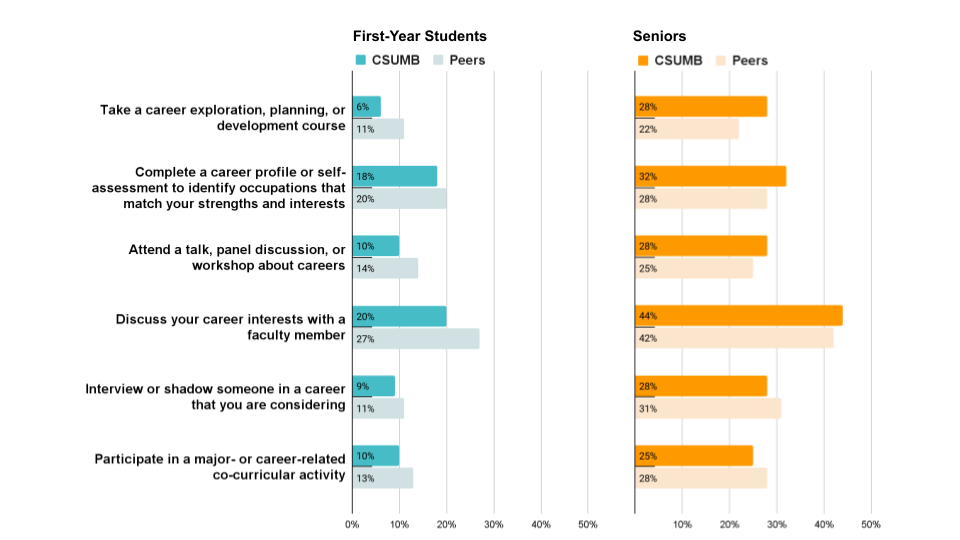
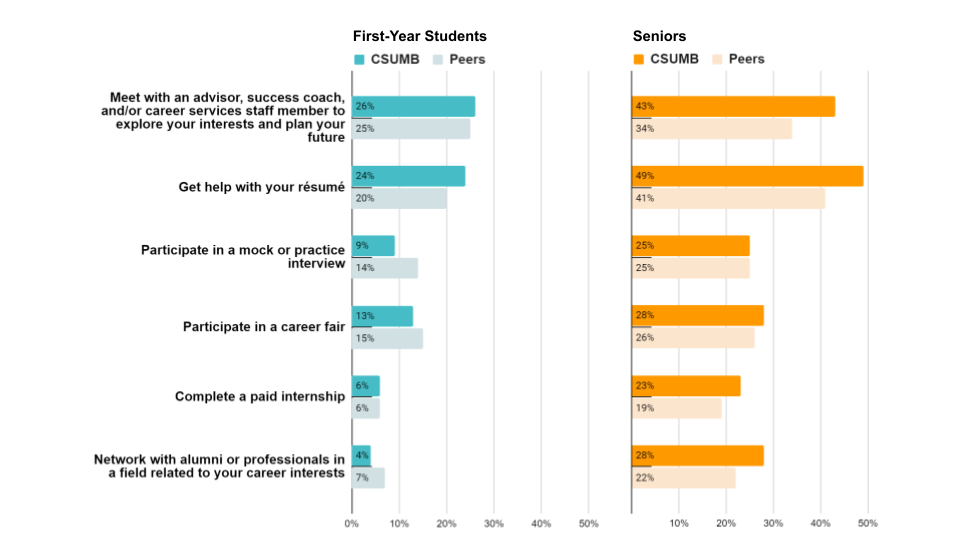
*Peer Institutions: 25 institutions (including three other CSUs) with a Carnegie classification of Public Masters that also completed the NSSE - Career & Workforce Preparation topical module in 2023.
Source: NSSE - Career & Workforce Preparation (2023).
CSUMB First-Year and Senior NSSE Respondents and Peer Institution* Comparisons Data Table
Which of the following have you done or do you plan to do at this institution before you graduate (whether in person or online)?
Item NSSE First-Year Respondents - CSUMB NSSE First-Year Respondents - Peers NSSE Senior Respondents - CSUMB NSSE Senior Respondents - Peers Take a career exploration, planning, or development course 6% 11% 28% 22% Complete a career profile or self-assessment to identify occupations that match your strengths and interests 18% 20% 32% 28% Attend a talk, panel discussion, or workshop about careers 10% 14% 28% 25% Discuss your career interests with a faculty member 20% 27% 44% 42% Interview or shadow someone in a career that you are considering 9% 11% 28% 31% Participate in a major- or career-related co-curricular activity 10% 13% 25% 28% Meet with an advisor, success coach, and/or career services staff member to explore your interests and plan your future 26% 25% 43% 34% Get help with your résumé 24% 20% 49% 41% Participate in a mock or practice interview 9% 14% 25% 25% Participate in a career fair 13% 15% 28% 26% Complete a paid internship 6% 6% 23% 19% Network with alumni or professionals in a field related to your career interests 4% 7% 28% 22%
CSUMB Senior NSSE Respondents by Admit Type
Which of the following have you done or do you plan to do at this institution before you graduate (whether in person or online)?
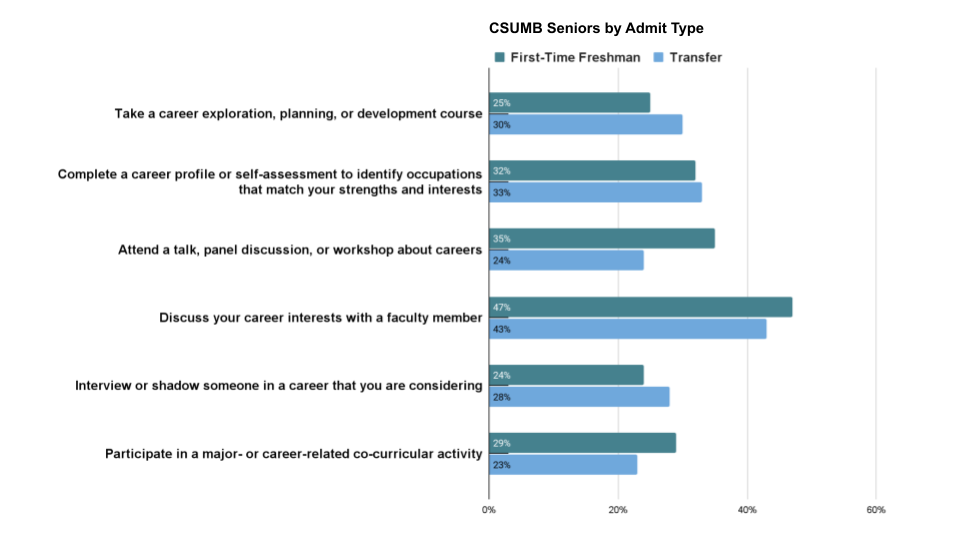
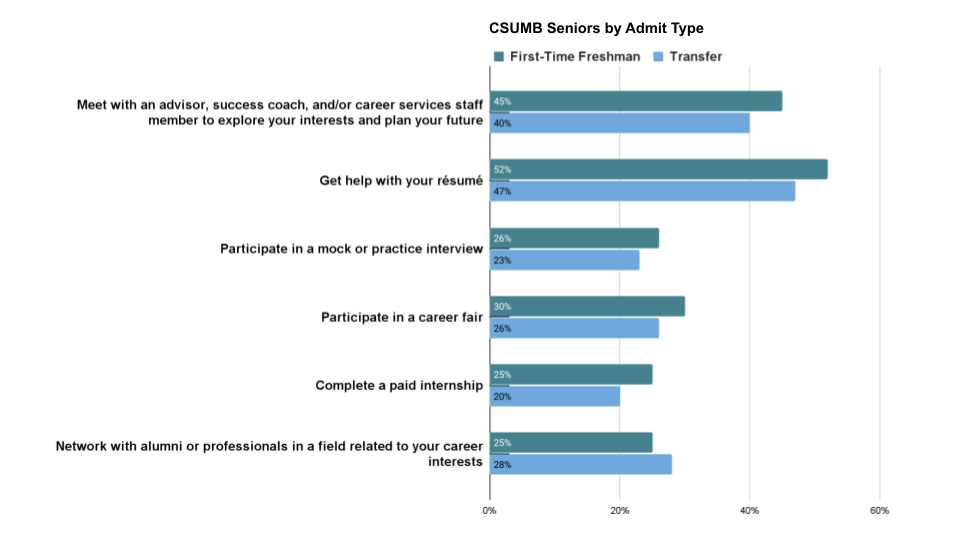
Source: NSSE - Career & Workforce Preparation (2023).
CSUMB Senior NSSE Respondents by Admit Type
Which of the following have you done or do you plan to do at this institution before you graduate (whether in person or online)?
CSUMB Senior NSSE Respondents - First-Time Freshman CSUMB Senior NSSE Respondents - Transfer Take a career exploration, planning, or development course 25% 30% Complete a career profile or self-assessment to identify occupations that match your strengths and interests 32% 33% Attend a talk, panel discussion, or workshop about careers 35% 24% Discuss your career interests with a faculty member 47% 43% Interview or shadow someone in a career that you are considering 24% 28% Participate in a major- or career-related co-curricular activity 29% 23% Meet with an advisor, success coach, and/or career services staff member to explore your interests and plan your future 45% 40% Get help with your résumé 52% 47% Participate in a mock or practice interview 26% 23% Participate in a career fair 30% 26% Complete a paid internship 25% 20% Network with alumni or professionals in a field related to your career interests 25% 28%
What career preparation resources does CSUMB provide and what did NSSE respondents share about these areas?
Take a career exploration, planning, or development course
“Have an upper-division course that helps students plan their careers instead of forcing them to do a class outside their major. I would have much rather taken a class about furthering my career and career goals…” - NSSE Senior respondent
“Dedicate more courses that help students ease their way into their industries during their final year.” -NSSE Senior respondent
Career Development Office:
- Career Advisors attend all First Year Seminar and Major Pro-Seminar courses and are available to visit additional classes at the professor’s request
- Embedding Career Services in more classes is necessary
- A goal is to have Career Advisors visit all First Year Seminars, Major Pro-Seminars, and Capstone courses
- Currently, there is no requirement for career-oriented courses
- An upper-division course, Career Development for Applied Environmental Sciences, is now being offered
- Upper-division career development courses are needed in other programs as well
Complete a career profile or self-assessment to identify occupations that match your strengths and interests
Career Development Office:
- A Career Assessment is available to help students explore major and career possibilities
- Career Advisors encourage all students to meet with them to discuss their assessment results and career possibilities
Attend a talk, panel discussion, or workshop about careers
“Bring career development to us, such as via in-class workshops. Students often feel too busy to put an extra thing on their plates.” -NSSE Senior respondent
Career Development Office:
- Career Services hosts over 180 career-related workshops and network events for all degree programs and organizations
- Some workshops include: “Ask a Recruiter,” “The Future of Work: What College Graduates Need to Know,” and “How to Research and Apply for an Internship”
- Faculty members can partner with Career Services to schedule an in-class workshop
- See also upcoming career events
Meet with an advisor, success coach, and/or career services staff member to explore your interests and plan your future
“Push meeting with a career advisor as much as it is pushed to meet with an academic advisor.” -NSSE Freshman respondent
“...I am very appreciative of the career services department.” -NSSE Senior respondent
Career Development Office:
- The Center for Advising, Career, and Student Success strongly believes that academic and career advising should be mandatory for all students
- Currently, career advising is an optional resource, but Career Services encourages all students to meet with a Career Advisor
- Data shows that students who visit the Career Development Office at least once during their undergraduate degree have a higher probability of landing an internship and job after graduation compared to those who do not
- See: Why You Should Visit Your College’s Career Center and The Value of Career Services
Get help with your resume
Career Development Office:
- Career Services visits all First-Year Seminar courses to discuss students’ career planning roadmap
- Topics covered include internships, full and part-time job opportunities, research projects, resume building, cover letters, salary negotiation, professional development, and graduate school preparation
- Resume and cover letter resources are provided by Career Services
Participate in a career fair
Career Development Office:
- Career Services organizes two job and internship fairs each year. See upcoming career events
- In the the fall and spring terms, over 65 employers are present on-site at our job and internship fairs offering full and part-time opportunities to CSUMB students, alumni, and the community
- All students are invited to participate in these fairs to explore career opportunities or to come prepared to interview with prospective employers and leave with a job or internship offer
Complete a paid internship
“The school offers a variety of opportunities for the students to intern at. I love my internship at CSUMB because it has taught me a lot about athletic training.” - NSSE Senior respondent
Career Development Office:
- Career Services assists students with on-campus student positions, internships, and summer jobs, as well as full-time and part-time off-campus jobs through our job posting board, OtterJobs
- Students who qualify for Federal work-study can use their federal work-study award to work on campus open positions
- All students are encouraged to contact Career Services to discuss working while pursuing their undergraduate degree
Network with alumni or professionals in a field related to your career interests
“Have professionals visit specific classes and explain how they would better prepare for their current career path if they could go back and do it all again.” -NSSE Senior respondent
“It would be helpful if individual courses had previous students present to the class about their experience applying for jobs and what their current career is…” -NSSE Senior respondent
“Mentors who review career opportunities or connect you to other individuals in different careers would be very beneficial to all students.” -NSSE Senior respondent
How do CSUMB faculty support student career preparation and placement with reference letter writing?
Regardless of tenure track status, CSUMB’s faculty report they support student career preparation and placement by writing letters of recommendation for graduate or professional school, post-graduation employment, internships, and academic honors and awards.
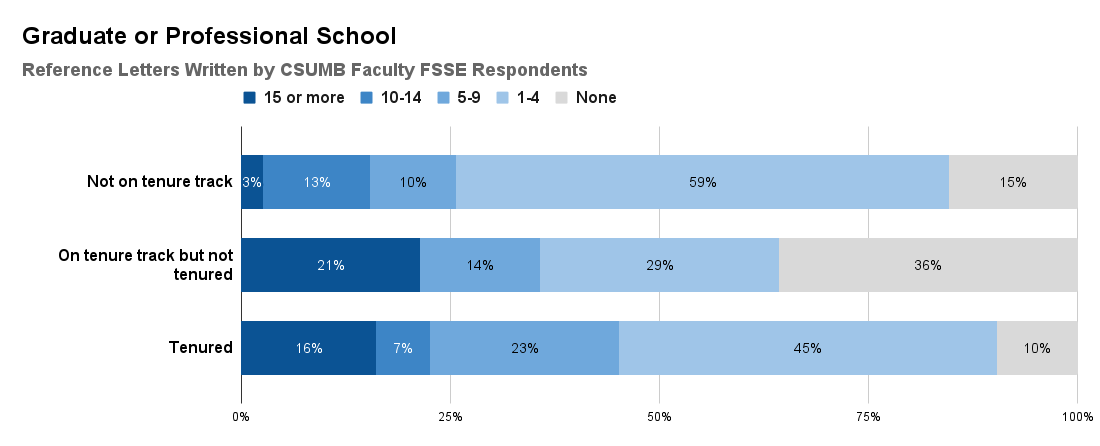
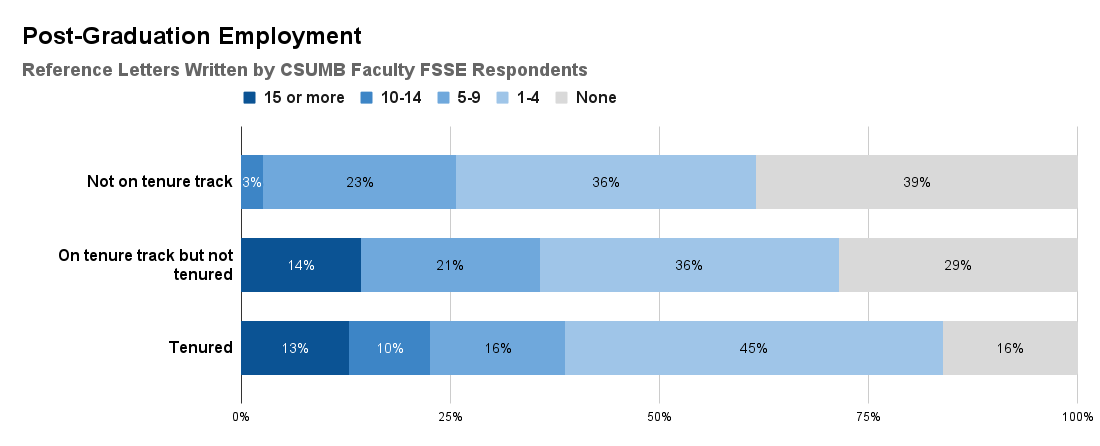
.png)
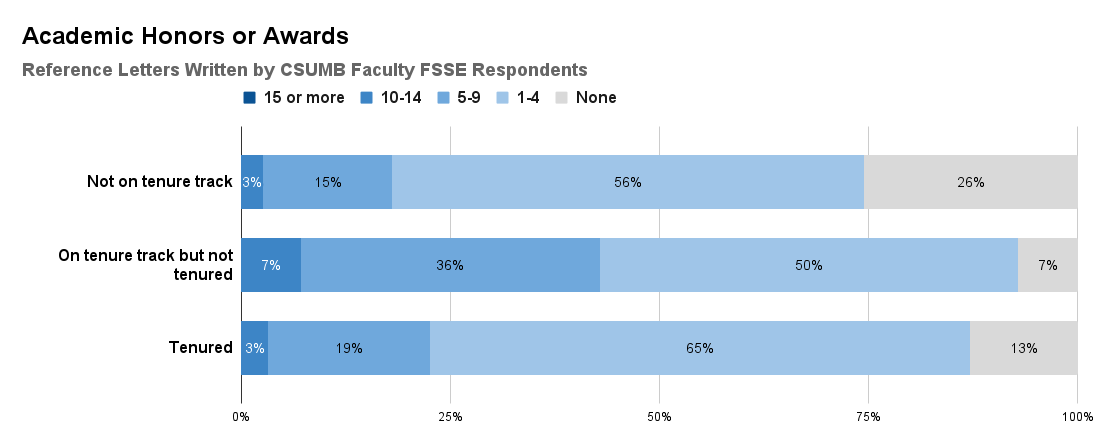
Source: FSSE - Transferable Skills, Career, and Workforce Development (2023).
Reference Letters Written by CSUMB Faculty FSSE Respondents
Graduate or Professional School
Not on tenure track On tenure track but not tenured Tenured 15 or more 3% 21% 16% 10-14 13% 0% 7% 5-9 10% 14% 23% 1-4 59% 29% 45% None 15% 36% 10% Post-Graduation Enrollment
Not on tenure track On tenure track but not tenured Tenured 15 or more 0% 14% 13% 10-14 3% 0% 10% 5-9 23% 21% 16% 1-4 36% 36% 45% None 39% 29% 16% Pre-Graduation Job Experience (e.g., Internships)
Not on tenure track On tenure track but not tenured Tenured 15 or more 5% 7% 3% 10-14 0% 0% 7% 5-9 13% 29% 7% 1-4 37% 43% 61% None 45% 21% 23% Academic Honors or Awards
Not on tenure track On tenure track but not tenured Tenured 15 or more 0% 0% 0% 10-14 3% 7% 3% 5-9 15% 36% 19% 1-4 56% 50% 65% None 26% 7% 13%
Where can I find additional data from the 2023 NSSE and FSSE?
National NSSE and FSSE Data Summaries
CSUMB’s NSSE Data
- Complete the IAR Online Data Access request to gain access to the NSSE Report Builder, NSSE Online Report, or the NSSE open-ended comments in IAR’s Qualitative Survey Reporting Tool
How representative were CSUMB’s NSSE response rates?
Generally, NSSE response rates across various demographics for both First-Year and Senior respondents were representative of CSUMB’s 2023 Spring enrollments of Freshman and Seniors.
NSSE respondents were somewhat more likely to have started college at CSUMB as First-Time students, were more likely to be First Generation students, were somewhat more likely to be female, and were somewhat more likely to be Hispanic or Latino.
Demographic NSSE 2023 - First Year Respondents CSUMB 2023 Spring - Freshman Enrollments NSSE 2023 - Senior Respondents CSUMB 2023 Spring - Senior Enrollments Begin College: Started here / First-Time Freshman 94%
90%
36%
31%
Begin College: Started elsewhere / Transfer / Transitory 6%
10%
64%
69%
First Generation 55%
39%
61%
53%
Institution-reported Sex: Female 60%
59%
62%
59%
Institution-reported Sex: Male 40%
41%
37%
41%
Institution-reported Sex: Another 0%
0%
0%
0%
Institution-reported Race or Ethnicity: American Indian or Alaska Native 0%
1%
0%
1%
Institution-reported Race or Ethnicity: Asian 5%
8%
5%
7%
Institution-reported Race or Ethnicity: Black or African American 2%
3%
2%
3%
Institution-reported Race or Ethnicity: Hispanic or Latino 43%
38%
44%
45%
Institution-reported Race or Ethnicity: Native Hawaiian/Other Pac. Islander 0%
1%
1%
1%
Institution-reported Race or Ethnicity: White 33%
31%
28%
28%
Institution-reported Race or Ethnicity: Foreign or nonresident 6%
6%
6%
5%
Institution-reported Race or Ethnicity: Two or more races/ethnicities 6%
8%
11%
8%
Institution-reported Race or Ethnicity: Other/Unknown 4%
4%
3%
3%
*Percentages may not sum to 100% due to rounding.